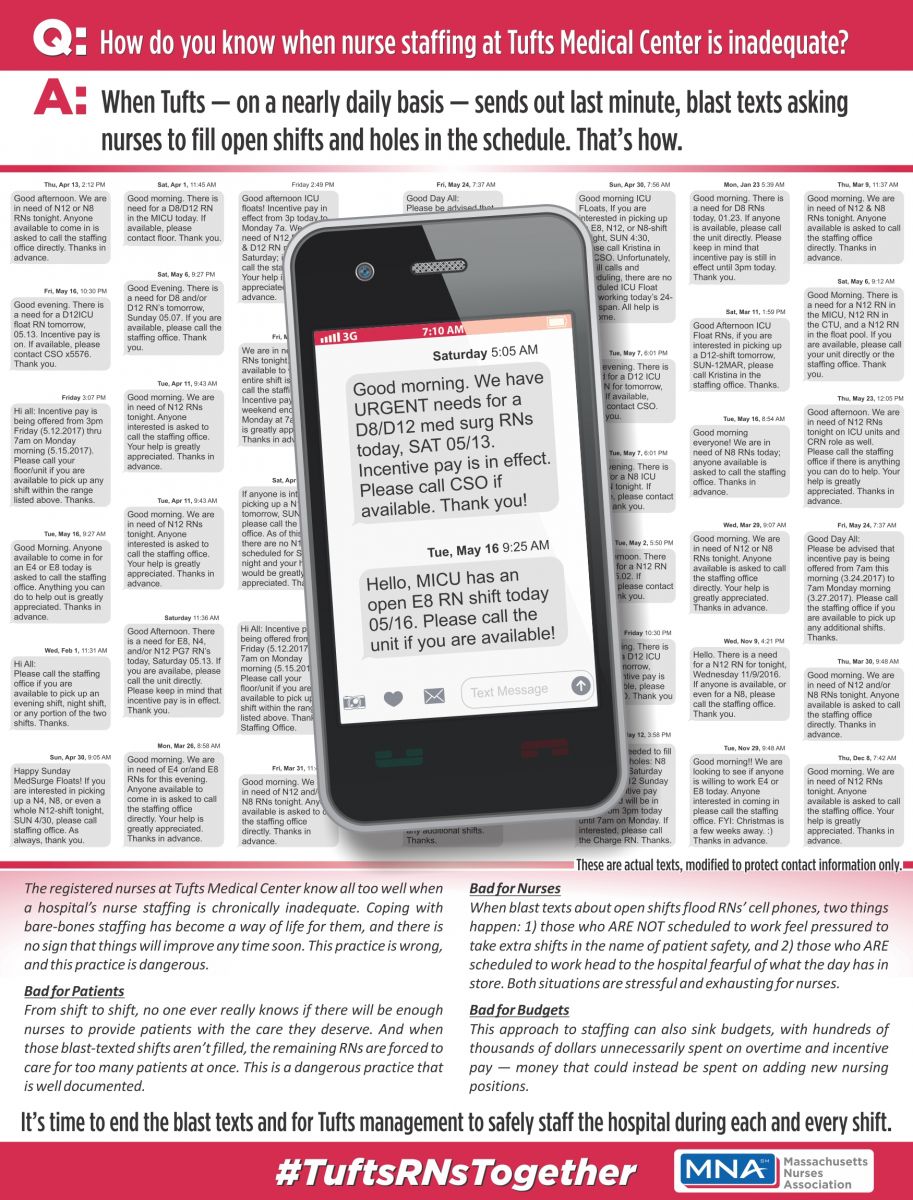The registered nurses at Tufts Medical Center, who are represented by the Massachusetts Nurses Association (MNA), cast an overwhelming vote last night rejecting the hospital’s “last, best, and final” contract offer.
That offer was presented to the nurses at their last negotiation session on May 31, but it failed to adequately address the nurses’ key outstanding issues. Those issues include chronic staffing problems, and the hospital’s inability to recruit/retain nurses due to the uncompetitive wages, and the worst pension plan in comparison to other city hospitals and most surrounding community hospitals.
“I am proud of the strength of the Tufts nurses, strongly advocating for their patients,” said Mary Havlicek Cornacchia, bargaining unit co-chair and OR nurse. “This vote sends a clear message to hospital administration that they need to provide the resources necessary for safe patient care and competitive compensation.”
The vote took place from 6:30 a.m. to 8 p.m. on Thursday, June 8, at the DoubleTree Hotel on Washington Street across from the medical center, as well as at MNA headquarters in Canton. Nurses cast their vote by secret ballot.
The Tufts RNs have been in talks with management for a new contract since April of 2016, and 32 sessions were held before management forced a last, best, and final offer on the union. A federal mediator, who has been involved in the negotiations since April, has requested that the parties return to the table on Monday, June 12 for another negotiation session.
Long-Standing Concerns over Safe Staffing and Safe Patient Care
At the heart of the no-vote is the issue of patient safety. In the current environment at Tufts, nurses across all units and floors are contending with unsafe staffing situations on a daily basis, with many units reporting constant unsafe staffing levels. The result is too many RNs are regularly carrying patient assignments that are too large and unsafe. In response, the RNs recently launched an ad campaign that displays dozens upon dozens of “blast texts” from management that call on nurses to fill staffing holes last minute.
“During these negotiations, we have offered a variety of proposals that would address the staffing problems — from unit-specific nurse-to-patient limits, to adding charge nurses who would start each shift without a patient assignment,” added Havlicek Cornacchia. “But management has countered with proposals that only act as Band Aids on what has become a very large wound.”
Simultaneously, hospital management insists on using a fragmented and broken system of temporary reassignment as a way of trying to deal with its chronic staffing challenges. This results in RNs being directed to work on units and floors where they are unfamiliar and/or untrained to safely care for patients.
A Need to be Market Competitive
In addition to having some of the worst staffing conditions in the city, Tufts Medical Center has also become the hospital with the lowest wages and retirement benefits in the city. “The hospital’s last, best, and final offer did not effectively address these vital issues,” explained Barbara Tiller, union co-chair and an IV/PICC/CRN nurse. “Without market competitive wages and benefits, Tufts cannot recruit and retain the nurses it needs, and the staffing problem spirals downward.”
Management has proposed freezing the defined benefit pension plan for approximately 350 RNs and instituting a divisive, inequitable, and complex catchup mechanism as part of a proposed higher-risk 403(b) matching program. That change would result in significant losses in retirement funding for most nurses. Meanwhile, RNs in the defined contribution plan would continue to receive the lowest employer contribution of all nurses in the city.
Again, the nurses have proposed a new pension plan that would benefit all RNs while still resulting in millions of dollars in cost savings for the hospital. This proposed plan, which is a multi-employer defined benefit pension plan, would add as much as $11 million to Tufts’ bottom line, would eliminate more than $25 million in pension liability, and would save as much as $8 million by eliminating the costs of administering and insuring the plan. Management has refused to engage in any real talks on this issue.
“We are extremely grateful to the nurses for coming out to vote and for sending a clear message to management that this contract will not get us, or the hospital, to where we need to be,” added Tiller. “The hospital needs to provide better staffing, more resources, and a competitive wage/pension package to build and sustain a nursing department at Tufts Medical Center that is renowned for its excellence in patient care.”

“
